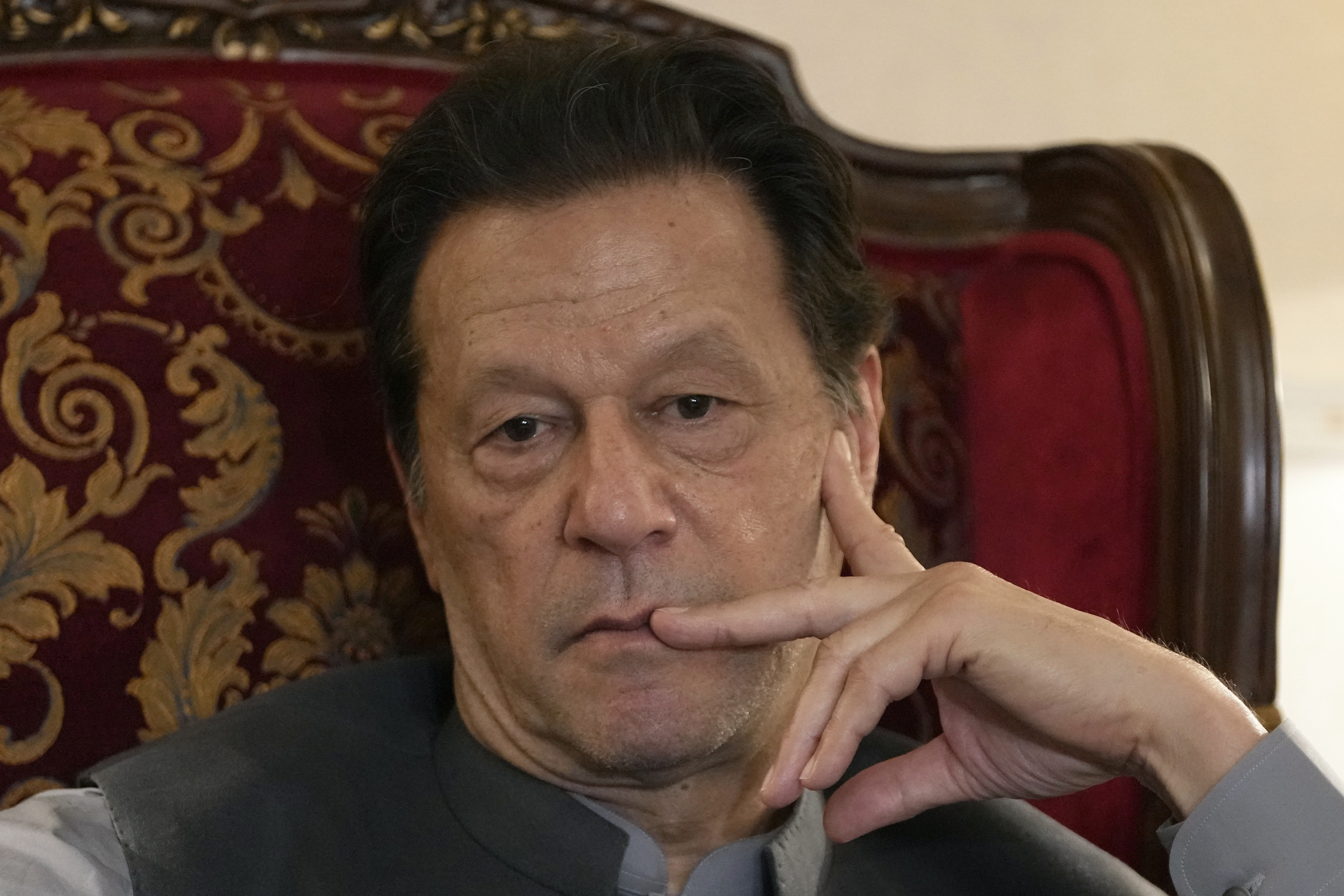
Islamabad, Pakistan – A United States-based news outlet has published what it claims to be the details of a diplomatic “cypher” – or a secret cable – that suggests the US administration wanted to remove former Pakistani Prime Minister Imran Khan from power last year.
Khan was sacked from power in April 2022 after he lost a no-confidence vote in parliament. He alleged he knew of the “cypher” while he was in office which, according to him, proved the US hatched a conspiracy with the help of his political opponents and the Pakistani military to remove him.
He later made a U-turn, saying he wants good relations with the US, but continued to blame his successor Prime Minister Shehbaz Sharif and the military for orchestrating his removal.
Khan is currently serving a three-year sentence and has been barred from politics for five years after he was convicted of corruption charges by a court in the capital Islamabad last week. He denies the charges and says the action against him is aimed at stopping him from contesting elections, expected later this year.
On Wednesday, The Intercept news website published purported details of a conversation between Pakistan’s then-ambassador to the US, Asad Majeed, and Donald Lu, the Assistant Secretary of State for the Bureau of South and Central Asian Affairs, on March 7 last year.
The conversation, according to the report, took place less than two weeks after Khan visited Moscow on February 24, the day Russia invaded Ukraine.
In the meeting, Lu reportedly told Majeed the US and Europe were “quite concerned” about Khan visiting Russia and Pakistan taking an “aggressively neutral position” on the Ukraine war.
“I think if a no-confidence vote against the prime minister succeeds, all will be forgiven in Washington because the Russia visit is being looked at as a decision by the prime minister. Otherwise, I think it will be tough going ahead,” Lu is alleged to have told Majeed, who sent the details of the conversation in the “cypher” to Islamabad.
“One month after the meeting with US officials documented in the leaked Pakistani government document, a no-confidence vote was held in Parliament, leading to Khan’s removal from power,” said The Intercept.
US State Department spokesperson Matthew Miller on Wednesday said the comments reported in The Intercept do not show the US taking a position on who should be Pakistan’s leader, adding that the US had publicly and privately expressed its concern regarding Khan’s visit to Russia.
“But as the former Pakistani ambassador to the United States himself has stated, the allegations that the United States has interfered in internal decisions about the leadership of Pakistan are false. As we have stated, they are false. They have always been false, and they remain false,” Miller said.
Pakistan’s foreign ministry has not issued any statement on The Intercept’s report.
Rana Sanaullah, Pakistan’s interior minister until the parliament was dissolved late on Wednesday, dismissed the report in an overnight post on X, formerly known as Twitter.
“Though there is nothing new in this story, the investigation needs to be held to establish the authenticity of the information or source document. Potentially, it is a very sinister, treacherous, and seditious act,” he wrote.
A former Pakistani diplomat told Al Jazeera on condition of anonymity the contents of the alleged cypher can be seen as commenting on the country’s internal policies, but “there was nothing beyond that”.
“The tone and tenor of the conversation recorded in the cypher took me by surprise, but I don’t think there was anything more to it, in context of the alleged conspiracy,” he said.
But Raoof Hasan, spokesman for Khan’s Pakistan Tahreek-e-Insaf (PTI) party, said the Intercept report validates the former prime minister’s stance since his removal.
“When the government received the cypher, Khan did the right thing as he took it to the National Security Committee [NSC], in which it was unanimously agreed that it amounted to blatant interference in Pakistan’s internal affairs and was entirely unacceptable,” Hasan told Al Jazeera.
The PTI spokesman said the Sharif government also held an NSC meeting to discuss the cypher matter, where the previous decision of the committee was endorsed.
“The new government, led by Shehbaz Sharif, also conducted their own meeting with the NSC and they approved the decisions taken under the PTI government and accepted that it was a grave interference in Pakistan’s internal affairs.”







